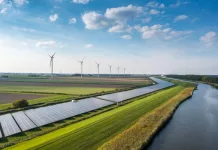In the heart of the United States, a movement is rekindling that champions the transition from corporate to community-owned utilities. Public power has deep roots that stretch back almost 150 years in the Midwest, and its reemergence presents an intriguing opportunity for communities nationwide. The American Public Power Association (APPA) stands as a testament to this vision, with its mission of enhancing public power utilities through advocacy, education, and collaboration.
The Case for Public Power
The allure of public power is clear and compelling. Local customers benefit from power that is distributed on a non-profit basis, prioritizing their needs above all. With cost-based rates, reliable service, and the reinvestment of spending on energy back into the community, the public power model accentuates local control and decision-making. A fascinating snippet of history reveals that the broad concept of public utilities in America dates back to a grist mill in Dedham, Massachusetts, in 1640, illustrating a long-standing tradition of communal resource management.
Understanding the Landscape of US Utilities
The scale of utility operations in the US is enormous, with around 3,000 electric utility companies energizing the lives of over 140 million customers. The electricity production by these companies unsurprisingly translates into significant annual revenue, presenting a formidable industry to reform.
The Current Climate: Public vs. Private Utilities
There is a visible uptick in initiatives striving to dethrone investor-owned electric utilities and usher in public ownership. Advocates of “public power” argue that the shift can lead to enhanced service, reduced costs, a faster pivot to renewable energy, and heightened accountability—a transformation eagerly pursued in roughly a dozen communities across the country.
Resistance and Challenges to the Public Power Movement
The transition to publicly owned utilities, however, meets staunch opposition. Private utilities, using extensive funding, have previously succeeded in swaying public opinion against the shift to a public model, as seen in Maine’s referendum outcome. Grassroots activism faces well-entrenched corporate interests that are deeply interwoven with regulatory bodies and the media, complicating efforts to reshape the industry.
The Privatization of Public Utilities: A Cautionary Tale
Amid the ongoing struggle to protect and proliferate public utilities, there is also the opposing trend of privatization where corporations takeover existing public utilities, as was the case in El Paso, Texas.
Climate Considerations and the Public Power Agenda
The advancement of public utilities also intersects with climate activism. Typically more beholden to financial gains than environmental concerns, public utilities have, at times, resisted the adoption of renewables such as rooftop solar. Ultimately, a shift towards a public utility model is seen as better aligned with the urgent need for climate action.
Engagement and Support for Public Energy Campaigns
Various groups across the nation are tirelessly campaigning for the cause of public utilities. If you are inclined to lend your support or seek more information, below are some contacts that represent these efforts:
Local Campaigns:
- Power San Diego (San Diego, CA)
- Metro Justice (Rochester, NY)
- Ann Arbor for Public Power (Ann Arbor, MI)
- Maine Public (Bangor, Lewiston, Portland, ME)
- Office of The Public Advocate for the City of New York (New York, NY)
- We Power DC (Washington, DC)
- Public Power New Mexico (Santa Fe, NM)
- South San Joaquin Irrigation District (SSJID) (Escalon, Manteca, Ripon, CA)
- Power to the People Milwaukee (Milwaukee, WI)
- The Utility Reform Network (TURN) (Oakland, CA)
- Decorah Power (Decorah, IA)
- Tucson, AZ (study on potential of public utility)
National Organizations:
- The Next System (Public power think tank and activist center)
- The Democracy Collaborative (University of Maryland)
- Public Power Council (WA)
- Th!rd Act (Ripton, VT)
For those passionate about public power, the journey ahead holds promise and many challenges. This list of groups and organizations represents the front-line fighters in this transformative cause. The time for ‘good trouble’ continues as the pursuit for public power charges ahead.

























